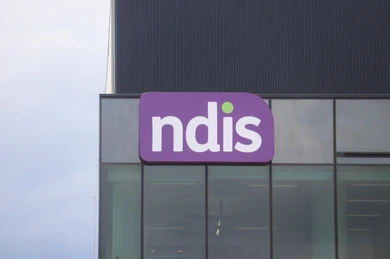Exposed: The cunning method criminal syndicates use to swindle millions from the NDIS – are you at risk?
By
- Replies 10
The National Disability Insurance Scheme (NDIS) has been a lifeline for individuals living with disabilities and their caregivers, providing much-needed access to support and services.
However, like any government program, it has its downsides. Criminals have been exploiting vulnerable members of the NDIS and stealing millions of dollars from taxpayers.
This has resulted in a significant loss of funds that could have been allocated to the individuals who require it the most.
Since its creation in October, the NDIS fraud fusion taskforce has been reviewing suspicious payments, with a staggering $300 million currently under scrutiny.
The figure has increased by $50 million in just three months, and the taskforce has received 1,700 tip-offs in one month alone.
The task force is investigating 38 cases, including accusations that crime syndicates are using cash vouchers and gifts to lure Australians into faking medical evidence and diagnosis of disability to sign up for the scheme.

There have also been reports of individuals using NDIS funds to pay for luxury lifestyle items and holidays.
Additionally, there are allegations of fraudulent payments made for services that were never delivered or that the client should not be eligible for.
NDIS Minister Bill Shorten has been fighting back since the matter first arose.
'Every single tip-off will be analysed,' he said in a statement.
'We are encouraging people to continue to help us in our efforts to stamp out dodgy behaviour.'
It was reported in August that the Hamzy network, notorious for operating in western Sydney, was one of the groups accused of defrauding the NDIS.
Shockingly, network members allegedly used violence to extort intellectually disabled individuals. One person was reportedly threatened with a knife, while another family was threatened with death by standover merchants attempting to steal their NDIS entitlements.
In another case, an individual was allegedly threatened with being committed to a psychiatric ward unless they assisted criminals in scamming the system.
According to Michael Phelan, the Australian Criminal Intelligence Commission Chief, up to 20 per cent of the NDIS annual budget of almost $30 billion may have been misused.
To combat this issue, last year's federal budget established the $126.3 million anti-fraud NDIS task force, which includes the federal police, tax office, and Australian Criminal Intelligence Commission.
The National Disability Insurance Scheme (NDIS), which was legislated in 2012 and went into full operation in 2020, is designed to provide essential funding and care to half a million Australians who need it.
However, the rapid growth of the NDIS is making it an increasingly costly program, with more than 280,000 Australians recently joining, and costs for every individual on the NDIS are expected to rise by 18.6 per cent over the next four years.
The NDIS was designed over a decade ago and was projected to cost $166.6 billion over four years. However, it turned out to be an underestimate of $8.8 billion.
Still, Treasurer Jim Chalmers is determined to make the NDIS a sustainable scheme.
'We choose dignity for Australians with disability,' he said in a statement to Parliament last May.
'This Budget begins the task of repairing the NDIS and securing its future.'

Members, it is horrible to think that in addition to the everyday struggles of living with a disability on a daily basis, criminal networks are attempting to take advantage.
If you know of anyone being targeted by a suspicious group or individual, then contact your local police department or Crime Stoppers on 1800 333 000.
Stay safe out there, members! Also, feel free to share this article with your friends and loved ones so they can be informed too.
However, like any government program, it has its downsides. Criminals have been exploiting vulnerable members of the NDIS and stealing millions of dollars from taxpayers.
This has resulted in a significant loss of funds that could have been allocated to the individuals who require it the most.
Since its creation in October, the NDIS fraud fusion taskforce has been reviewing suspicious payments, with a staggering $300 million currently under scrutiny.
The figure has increased by $50 million in just three months, and the taskforce has received 1,700 tip-offs in one month alone.
The task force is investigating 38 cases, including accusations that crime syndicates are using cash vouchers and gifts to lure Australians into faking medical evidence and diagnosis of disability to sign up for the scheme.

The number of suspicious payments increased by $50 million in just three months. Credit: Shutterstock.
There have also been reports of individuals using NDIS funds to pay for luxury lifestyle items and holidays.
Additionally, there are allegations of fraudulent payments made for services that were never delivered or that the client should not be eligible for.
NDIS Minister Bill Shorten has been fighting back since the matter first arose.
'Every single tip-off will be analysed,' he said in a statement.
'We are encouraging people to continue to help us in our efforts to stamp out dodgy behaviour.'
It was reported in August that the Hamzy network, notorious for operating in western Sydney, was one of the groups accused of defrauding the NDIS.
Shockingly, network members allegedly used violence to extort intellectually disabled individuals. One person was reportedly threatened with a knife, while another family was threatened with death by standover merchants attempting to steal their NDIS entitlements.
In another case, an individual was allegedly threatened with being committed to a psychiatric ward unless they assisted criminals in scamming the system.
According to Michael Phelan, the Australian Criminal Intelligence Commission Chief, up to 20 per cent of the NDIS annual budget of almost $30 billion may have been misused.
To combat this issue, last year's federal budget established the $126.3 million anti-fraud NDIS task force, which includes the federal police, tax office, and Australian Criminal Intelligence Commission.
The National Disability Insurance Scheme (NDIS), which was legislated in 2012 and went into full operation in 2020, is designed to provide essential funding and care to half a million Australians who need it.
However, the rapid growth of the NDIS is making it an increasingly costly program, with more than 280,000 Australians recently joining, and costs for every individual on the NDIS are expected to rise by 18.6 per cent over the next four years.
The NDIS was designed over a decade ago and was projected to cost $166.6 billion over four years. However, it turned out to be an underestimate of $8.8 billion.
Still, Treasurer Jim Chalmers is determined to make the NDIS a sustainable scheme.
'We choose dignity for Australians with disability,' he said in a statement to Parliament last May.
'This Budget begins the task of repairing the NDIS and securing its future.'
Key Takeaways
- Criminal syndicates are targeting the National Disability Insurance Scheme (NDIS) and rorting hundreds of millions of dollars in taxpayer money.
- The NDIS fraud fusion taskforce, created in October, is reviewing $300 million of suspicious payments.
- Among the investigations are accusations that crime syndicates are using cash vouchers and gifts to get Australians to sign up for the NDIS by faking medical evidence and disability diagnoses.
- NDIS Minister Bill Shorten has vowed to crack down on the misuse of money meant to help the most vulnerable, with reforms expected to be announced soon.
Members, it is horrible to think that in addition to the everyday struggles of living with a disability on a daily basis, criminal networks are attempting to take advantage.
If you know of anyone being targeted by a suspicious group or individual, then contact your local police department or Crime Stoppers on 1800 333 000.
Stay safe out there, members! Also, feel free to share this article with your friends and loved ones so they can be informed too.










